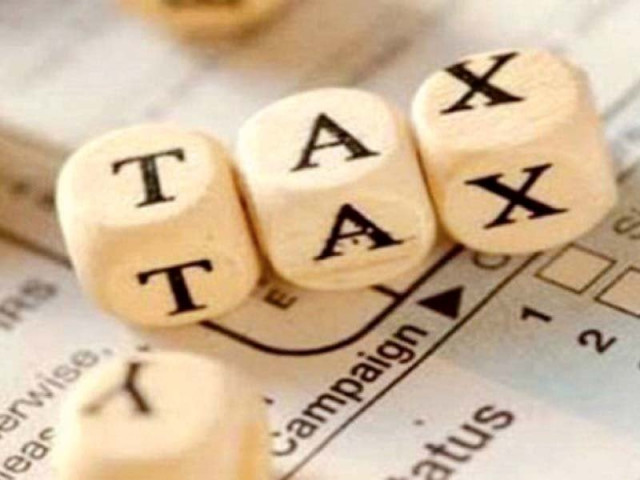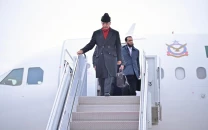Govt has no option but to slap at least 7.5% GST
Exporters and local suppliers divided over issue of withdrawal of tax concessions

KPRA meets sales tax target. PHOTO: CREATIVE COMMONS
The government of Prime Minister Imran Khan has no option but to slap at least 7.5% General Sales Tax at manufacturing stage to end abuse of zero tax facility for exporters of five sectors and meet a key condition of the International Monetary Fund (IMF).
Against the new proposed GST rate of 7.5%, the IMF wants that all concessional taxation rates should end from July and the textile sector should also be charged at 7.5%. The Minister of State for Revenue Hammad Azhar on Saturday told the industrialists about the IMF’s condition to end concessionary taxation regime.
The government plans to collect minimum Rs80 billion by bringing the domestic sales of five-export oriented sectors into the tax net from July. It faces a gigantic task of collecting Rs5.550 trillion in taxes next year - a goalpost that needs over 42% growth in revenues.
At present, the textile, garments, leather, surgical goods and sports goods manufacturers enjoy zero-sales tax facility on their exports, which the Federal Board of Revenue believes is also misused by the industrialists by declaring their domestic sales as exports. The concessionary sales tax regime is protected under Statutory Regulatory Order 1125.
A final round was held between the government and the industrialists at FBR Headquarter on Saturday before the presentation of the budget in the National Assembly on Tuesday.
The industrialists appeared divided between the ones who largely rely on exports and those whose goods end up in local markets.
Rs600b additional taxes likely in budget
The All Pakistan Textile Mills Association (Aptma) indicated to accept the new taxation regime subject to the condition that the sales tax rate for exports and imports must be same at 7.5% and their refunds be paid by commercial banks the moment they receive export proceeds.
However, industrialists like Zubair Motiwalla and Jawed Bilwani plainly refused to accept the government’s new tax regime, threatening to go on strike after the budget.
The situation appears to be worsening for Prime Minister Imran who is already facing a threat of judicial movement due to his decision to file a reference against Justice Qazi Faiz Issa - the judge of Supreme Court of Pakistan.
The sales tax levy matter will now be discussed with PM Imran on Sunday, according to the government officials.
“We apprised them (industrialists) of revenue loss of Rs80 billion annually on local sales of textile products, misuse of Duty and Tax Remission Scheme (DTRE) and the use of sales tax inputs collected on local production to claim export refunds,” Azhar told The Express Tribune.
The energy subsidy given to them is also being used to produce goods for local market, said the minister.
“We are close to a workable mechanism to address all these concerns,” said Azhar, while vowing to go ahead with the government’s plan to impose the tax at manufacturing stage.
Pakistan to pay $9.3b in external debt servicing
The total cost to the exchequer on account of taxes foregone on local sales of textiles due to zero rating, energy subsidies, misuse of DTRE and inputs of local sales being used to claim export refunds collectively amount to more than Rs200 billion annually, according to the finance ministry and FBR’s estimates.
The misuse of zero rating for local sales and using their inputs to claim refunds on exports needs to be stopped, they added.
The exporters have long been availing concessionary loans, subsidised energy and huge tax reliefs. Yet, the total exports of the country remained slightly negative during first ten months of this fiscal year.
“The talks between the government and the value added sector have failed and all the associations will observe strike if the government still goes ahead with its plan to withdraw zero rating facility,” said Bilwani, Chief Coordinator of Five Zero rated Export sectors, while talking to The Express Tribune.
He claimed that the representatives of the export-oriented sectors did not budge from their position of ‘No Payment No Refund’. He announced to address a press conference on Monday at Karachi Press Club.
The industrialists demanded continuity of energy subsidies on gas and electricity. The government is currently providing the imported RLNG at $6.5 per mmbtu and domestic gas at Rs600 per unit without distinction between local sales and exports.
The government is considering withdrawing the energy sector subsidies being availed on production used in the local markets.
The Aptma also demanded that there should be a new SRO 1125 defining indirect and direct exports based industry for the purpose of energy package which should cover the entire sector as already agreed in various meetings.
According to another demand of Aptma, the imposition of 7.5% GST should cover all imports at standardised rates. Any imports currently attracting more than 7.5% should also be brought to the new rate of 7.5% including all types of fibres, yarn, greige fabrics, all types of made ups and apparels, chemicals, packaging materials, all imports of raw materials imported under DTRE and other schemes.
Aptma has demanded that the 7.5% GST refunds should be measured on Freight on Board basis with effect from July 1 of this year. The refunds should be paid by the commercial banks at the time of submission of complete shipping documents.
Published in The Express Tribune, June 9th, 2019.
Like Business on Facebook, follow @TribuneBiz on Twitter to stay informed and join in the conversation.



















COMMENTS
Comments are moderated and generally will be posted if they are on-topic and not abusive.
For more information, please see our Comments FAQ